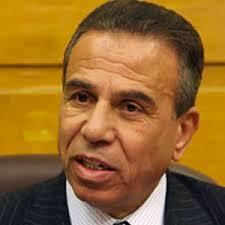IN MEMORIAM Abd El Azim Wazir 26 June 1945 – 8 May 2015

Abd El Azim Wazir was born in Beni-Sweif, a city from which his father was a Senator in the 1930s and this is how our friendship was established many years later. His father had served in the senate with my Grandfather who was its President and they were good friends and that is the first thing he mentioned to me when we first met in 1981. From that day on we became close friends and it was my pleasure and privilege to have worked with him at the AIDP and at ISISC, where he made many valuable contributions.
He was deputy Secretary General of the AIDP from 1989 to 2004, and then Vice President from 2004 to 2015; and an ISISC Board member from 1993 to 2009 and then Honorary Vice President from 2009 to 2015. He was also Secretary General of the Egyptian National group for over 30 years. In 1984 he was the Secretary General and principal organizer of the XIVth AIDP Congress held in Cairo; he also organized two Preparatory Colloquia in Cairo and in Alexandria respectively in 1993 and 1997. In 1988 he also organized an ISISC activity in Alexandria on Comparative Criminal Procedure.
At ISISC he was one of the professors in the series of training programs that the Institute launched for the Arab World in 1983. It was the largest rule of law program ever to be conducted for 15 Arab states. Because of its size and the number of persons involved in it, a new era for the rule of law and human rights in the Arab region was ushered in. Over 2,000 professors, judges, prosecutors, lawyers and police officers were involved in these programs and they have contributed to change in the culture of legality in the Arab world. It was this ISISC initiative, which he was an intricate part of, that opened up the Arab world in the eighties to human rights law. Those who attended ISISC’s programs took that knowledge as a basis to start new courses in their respective universities, and they introduced new dimensions of human rights in the administration of criminal justice. This included judicial institutes and police academies. We co-edited 5 volumes in Arabic on human rights and comparative Arab procedural systems which were widely used. Abdel Azim’s contributions to this entire endeavour were exceptional, and many still remember them in the Arab world.
Abdel Azim started his career as a police officer after graduating first in his class at the Police Academy from which he obtained a law degree with specialization in police sciences. He was selected to be an instructor and to continue with graduate studies. He remained at the Police Academy as an instructor and then professor for 10 years, retiring with the rank of Major after having obtained his Doctorate in criminal law from the University of Cairo. In preparation for the doctorate he spent two years studying in Paris.
After that he became a professor of criminal law and procedure and then dean at the University of El Mansoura, where his academic work was mostly centered on criminal law and criminal procedure. He published several highly regarded books on both subjects.
He was particularly respected and admired by students and colleagues. When he took a leave of absence in 1999 to become Governor of Damiette (Domyat) until 2004 and then from 2004 until 2011 as Governor of Cairo, his colleagues kept his office for him at the Law Faculty. And, in 2011 when he resigned as Governor he returned to his office as if he had never left the university.
For seven years he administered the Governorate of Cairo consisting of an estimated 18 million people, which is a larger population than over half the countries in the world. During these years there was never any question about Governor Wazir’s integrity, fairness, accessibility to the public and effectiveness. Few persons who held similar positions had such a reputation.
When he became Governor he had an apartment in which he lived with his family, a car, and an office in which he practiced law before assuming public office. Twelve years later that was what he left behind him, and that’s what I am sure he would want people to know and remember. To him integrity whether at the intellectual or practical levels were the most important qualities that he lived by.
Abdel Azim Wazir is one of those people who made a difference for others during his lifetime. He remained consistent during his entire career as an academic, and as a public official—modest, courteous, loyal, honest and friendly. He will be remembered with affection and respect by so many.
He leaves behind his beloved wife Sahar, two children, Khaled and Ola and two grandchildren, Omar Khaled Wazir and Sherif Karim Mandor.
As the Muslim saying has it: “From God we come and to God we return.” And so it is for those who, like Abdel Azim, are believers and who live their beliefs in practice.
M. Cherif Bassiouni
Professor Emeritus, DePaul University College of Law;
President, Instituto Superiore Internazionale Di Scienze Criminali;
Honorary President, Association Internationale de Droit Pénal.
